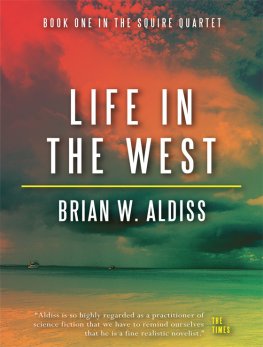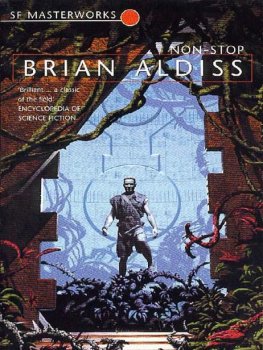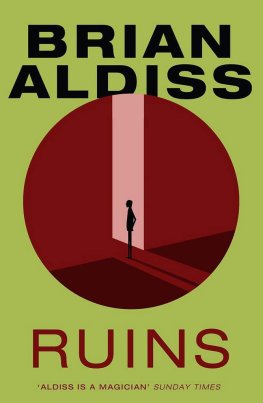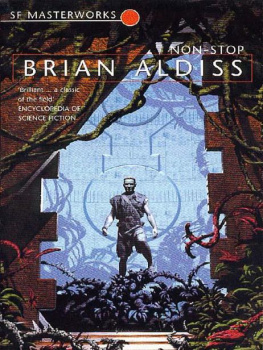Brian Aldiss
GREYBEARD

Science Fiction Masterworks Volume 87
Written with love for
CLIVE and WENDY
who now
understand the story behind this story
Greybeard is a novel about growing old, and about being old. Its every page is pregnant with the truth of that condition that ageing is a ceaseless, decaying passage towards the impossible asymptote of our own death. But the fact that he is writing science fiction enables Aldiss to focus this human universal (it is hard, in fact, to think of a more universal human theme) with extraordinary clarity. For in his imagined world a nuclear accident has rendered humanity sterile: the old get older, but there are no more births, and no new generation rises behind them to fill their place. It is a bleakly brilliant conceit, and Aldiss works through its implication with a superbly restrained, almost Hardyesque rigour. In part this has to do with some beautifully observed, and beautifully handled, nature writing, the continuing fecundity of some (though not all) the wildlife contrasting bittersweetly with the sterile decay of humanity:
They came to a wide sheet of water, patched with small islands and banks of rushes. The lake was a sanctuary for wildlife; dippers, moorhens, and an abundance of duck moved over or above its surface. In the clear waters beneath their centreboard, many shoals of fish were visible. They were in no mood to appreciate the natural attractions. The weather had turned blustery, they did not know in which direction they should sail. Rain, galloping over the face of the water, sent them scurrying for shelter under the spare sail. As the showers grew heavier and the breeze failed, Greybeard and Charley rowed them to one of the islands, and there they made camp.
It was dry under the sail, and the weather turned milder, but a sense of depression settled on them as they watched shawls of water and cloud embrace the landscape. Greybeard husbanded a small fire into life, which set them all coughing, for the smoke would not disperse.
Aldiss has never written better, or more evocatively lyrical, than this. It creates a sense of the world as rounded, finely observed, pregnant with myriad beauties.
Greybeard is a potent elegy for the human condition. Like a later masterpiece Cormac McCarthys The Road, Greybeard understands that humans do not endure through the grimmest times alone. Greybeard depends upon his wife Martha to give him purpose, and reason for living; and he is himself aware that being a fairly unimaginative chap is an advantage, since it prevents him from a capsizing comprehension of the approaching and inevitable end. But unlike the powerful but rather bludgeoning bleakness of McCarthys novel, Aldiss is shot through at all points with a weird, plangent beauty.
It will also remind the reader of P. D. James derivative Children of Men, a book that committed nothing short of larceny upon Aldiss (much better) novel and then failed to make anything much of its swag. James take gets bogged down in religious allegory and political hi-jinks, forcing an artificial climax with some daft gunplay. The film adapted from this book a much better work with very little in common with its source text likewise pulled its key punch. In both cases there was a sense that a world in which parturition had come to an end could only be made comprehensible through hope: a pregnant woman, a new child, the dawn coming round again.
Aldiss is clearer-eyed. He tropes his existential theme as anticlimax, a figure that shapes many of the novels set-pieces. Greybeard himself works as a contemporary historian, recording events for a future in which there will be literally nobody to read. Martha is kidnapped by a sex-maniac, chloroformed and tied up in a bedroom; but she is not raped. The novels characters travel in the hope of reaching the sea, but we never get there. Even the novels grand premise that there are no more children is eventually revealed as off-the-point.
Not to be pretentious (and in fact this novel is one of the most grounded, least pretentious ever written) but the resonance of Greybeard derives from the mellow skill with which it explores a crucial existential dilemma. We will all die. Some of us console ourselves with the thought that we will live again after our death, in a heaven perhaps, or reborn as humans in this world. Such fantasies are widespread, and for good reason, but they lack the heft of reality they are, in the strictest sense, escapist, as if death were only a prison from which the obedient or the wily might break through. In our bones we understand the blanker truth: there is no escape from death. So we turn instead to another consolation; we die, but our children will carry on, and our DNA will wriggle its threadworm way through other organisms. There is some relief in this thought, and from a longe dure perspective its kind of the point of our being here humans are only one of the many ingenious methods DNA has lighted upon to make more DNA. But it would be a strangely aloof human being who could take personal satisfaction in that fact.
This is the genius of Aldiss treatment. The discovery that children are still being born in the world is treated not as a flame of hope or redemptive twist, but with brilliantly pitched anticlimax as something largely irrelevant to the passing generation, a sort of knights move. Greybeard and his wife are still on the way to death. Greybeard, fundamentally, is about seeing the world unencumbered either by fantasies of individual or species survival. That such a view is not merely depressing says something about Aldiss enormous skill as a writer, but also perhaps it suggests that an existence beyond hope might be beyond fear as well. The theme is not in escape, but only in the fortitude with which we encounter the inevitable. That is the strength given to mortals, after all.
Given that it comes to many of us, and that most of us strenuously hope to reach it, its perhaps surprising how few great novels there are that actually confront the realities of old age. Most like Cervantes seminal Don Quixote are in fact fantasies of escape from decrepitude. Others, like Muriel Sparks Memento Mori, explore the consolations of mortality. But Aldiss novel takes a difference approach to either of these works. Greybeard is varied, beautifully observed and written, involving and profound without ever falling for the twin, related mendacities of consolation and escapism. It has a good claim to being Aldiss most fully realised novel.
Adam Roberts
A rifle was slung over his left shoulder by a leather strap. He moved silently along a path cut between coppiced sycamores as tall as he was. On the path ahead, a snake lay sunning itself. The day was warm for the time of year. He saw by its markings it was a harmless grass snake. It disappeared into the bushes at his approach. He had seen it there before.
As he came to the fish pond, a water rat jumped into the water with a smart plop. It always happened like that.
Greybeard worked his way round the bank of the pond among knots of elder which overhung the water. Crushing twigs in his progress, he smelt again the musty-sweet scent of their pith, a scent he had known since childhood. He looked down into the pond. The fish were as abundant as ever.
Everything was as before. The years ran through their cycles, but nothing changed.
He could see into the shallows where a chub waited under the bank among weeds. Or he could watch the surface of the water. There was reflected blue sky, patched with cloud. He stood where he was for a while, before recollecting himself. Then he could not remember what his thoughts had been.









